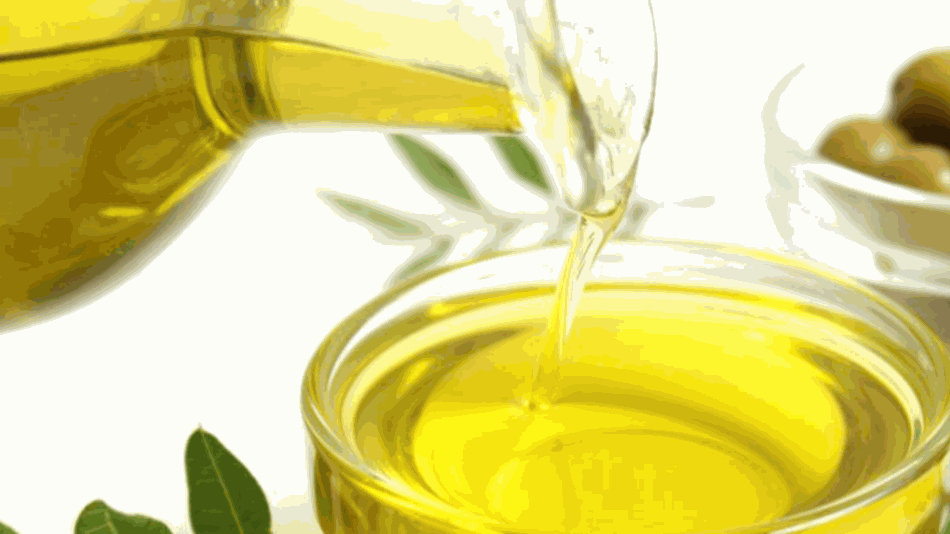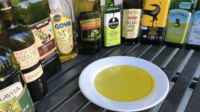Our Members Asked:
Which oils can help lower my cholesterol and risk of heart attack? How are coconut oil, olive oil, and fish oil for example?

Answer:
Lowering intake of saturated fats (and oils, which are fats) in your diet and replacing them with unsaturated fats, particularly polyunsaturated fats, can reduce cardiovascular disease by about 30%, similar to the reduction achieved by statin treatment, according to the American Heart Association (AHA) (Sacks, Circulation 2017). This will lower LDL ("bad") cholesterol.
Ideally, this should be done as part of an overall healthful dietary pattern such as the DASH (Dietary Approaches to Stop Hypertension) or Mediterranean diet. Note, however, that reducing saturated fats in the diet only to replace them with carbohydrates from refined grains (as opposed to whole grains) and added sugars does not prevent coronary heart disease.
Here are the foods high in saturated fat that the AHA recommends reducing in the diet, followed by foods containing primarily unsaturated fats which should replace foods in the first list in order to lower LDL cholesterol and the risk of cardiovascular disease:
Sources of saturated fat (to be decreased in the diet):
The main sources of saturated fats in the diet are dairy fat (butter), lard (pork), beef tallow, palm kernel oil, and, yes, coconut oil. In fact, 82% of coconut and palm kernel oil is saturated fat. The AHA advises against use of coconut oil because it has been found to increase LDL ("bad") cholesterol with no favorable offsetting effects. (Note: The AHA acknowledges that coconut oil can increase HDL ("good") cholesterol, but changing HDL "... can no longer be linked to changes in CVD [cardiovascular disease], and therefore, the LDL cholesterol-raising effect should be considered on its own.") Hence the AHA recommends substituting unsaturated fats for coconut oil and other sources of saturated fats. Like all fats, coconut oil is a source of energy and it has been argued that, because a high proportion of its saturated fat is the medium-chain variety, it may provide energy faster that other fats. While that may be true, it will increase LDL cholesterol relative to oils higher in unsaturated fats. [Update: A study in England found that extra virgin coconut oil was, surprisingly, no different in its effect on LDL levels than extra virgin olive oil (discussed below) in healthy, middle-aged adults who added 50 grams (1/4 cup) of either oil per day to their diets for four weeks — although both were better than adding an equal amount of unsalted butter. No comparison was made to adding a mainly polyunsaturated oil (Khaw, BMJ 2018).]
Sources of unsaturated fats (to replace foods above):
Canola oil, corn oil, soybean oil, peanut oil, and walnuts, are foods containing mainly unsaturated fats which are predominantly polyunsaturated. Olive oil (see our Review), avocados, almonds, cashews, hazelnuts, pistachios, and pecans also contain mainly unsaturated fats, but these are predominantly as monounsaturated fat, which, according to the AHA, is better than saturated fat and almost as good as polyunsaturated fat, although replacing monounsaturated fat with polyunsaturated fat may further lower LDL cholesterol. Safflower and sunflower oils fall somewhere between the two groups because although both are very low in saturated fat, the most commonly available products on the market are higher in monounsaturated fat (as oleic acid — the same found in olive oil) than older varieties of these oils which were higher in polyunsaturated fat (as linoleic acid).
Keep in mind that these sources of unsaturated fat will help your cardiovascular system if they are replacing saturated fat but not if you are just adding them to your existing diet. It takes about 2 years to achieve 60-70% of the full cardiovascular beneficial effects of these changes to your diet (Sacks, Circulation 2017).
Of course, reducing the risk of cardiovascular disease is not the only potential benefit of oils. Olive oil, particularly extra virgin olive oil, contains polyphenols and may improve blood sugar control and even reduce the risk of breast and colorectal cancers.
Other fats/oils:
The omega-3 fatty acids EPA and DHA found in fish oil may help treat inflammatory conditions, but they don't reduce the risk of cardiovascular disease when taken as a supplement -- although eating non-fried fish twice a week, instead of other meats, can, and high-dose, highly concentrated EPA and DHA can lower elevated triglycerides although it has not been directly proven to reduce the risk of cardiovascular disease.
Alpha-linolenic acid (ALA) in flaxseed oil does not reduce the overall risk of cardiovascular disease when taken as a supplement, but a diet rich in ALA appears to reduce the risk of high blood pressure and has been associated with a lower risk of fatal heart attacks.
Also see ConsumerLab.com's Reviews of Cholesterol-Lowering Supplements and Red Yeast Rice Supplements.
Join today to unlock all member benefits including full access to all CL Answers and over 1,400 reviews.
Join NowAlready a member? Sign In Here.
Join now at www.consumerlab.com/join/















Submit your comment
This feature is restricted to active members.
Join now to add comments and get all member benefits, including over 1,400 reviews.
Join NowAlready a member? Sign in here.